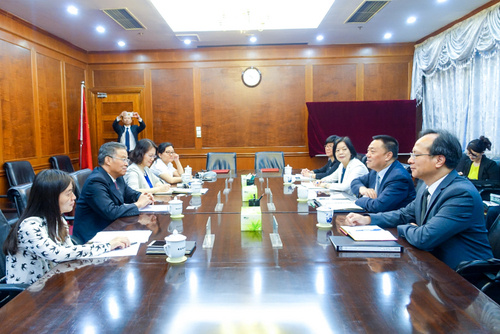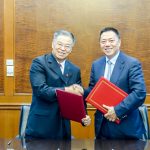 The Secretary for Economy and Finance, Mr Leong Vai Tac (pictured right, centre), and the Deputy Administrator of the State Administration of Taxation, Mr Wang Qinfeng (pictured left, centre), at the working meeting on Tuesday (July 19).
The Secretary for Economy and Finance, Mr Leong Vai Tac (pictured right, centre), and the Deputy Administrator of the State Administration of Taxation, Mr Wang Qinfeng (pictured left, centre), at the working meeting on Tuesday (July 19).
The Government has signed with the mainland a new memorandum on the reduction of taxation on aircraft and ship leasing business; and on tackling tax evasion on dividends, interest, royalties and capital gains. The Third Protocol to the Arrangement between the Mainland and the Macao SAR on the Avoidance of Double Taxation and Prevention of Evasion of Income Tax was signed in Beijing on Tuesday (19 July). The Secretary for Economy and Finance, Mr Leong Vai Tac, and the Deputy Administrator of the State Administration of Taxation, Mr Wang Qinfeng, signed in Beijing the document on behalf, respectively, of the Macao Government and the Central Government. The memorandum includes: a reduction in the withholding tax on lease rentals in aircraft and ship leasing businesses (which are treated as royalties) from 7 percent to 5 percent; and enhancements to measures for tackling tax evasion on dividends, interest, royalties and capital gains. Such initiatives were to encourage and motivate investment, promote economic diversification and to enhance further Macao’s role in the country’s development of the Silk Road Economic Belt and the 21st Century Maritime Silk Road (collectively known as the “Belt and Road” initiative). Mr Leong indicated that the new protocol on tax would better guarantee the fairness of the taxation system as applied to residents of the Macao and of the mainland, as well as creating a better business environment and enhancing transparency on taxation in order to tackle tax evasion. The Arrangement was first signed in 2003, with subsequent revisions in 2009 and 2011.
View gallery


